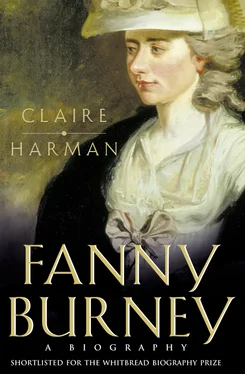The choice of Mrs Greville helped re-establish Charles Burney’s connection with his former patrons, but it also had a literary significance, since Mrs Greville was not just a formidable intellectual but an accomplished poet, whose ‘Prayer for Indifference’ – published in 1759 – became one of the most famous poems of its day. The Burneys must have expected something substantial to come of the connection, for Fanny’s sharp judgements of her godmother both personally – she thought Mrs Greville ‘pedantic, sarcastic and supercilious’ 38 – and as a godparent – ‘she does not do her duty and answer for me’ 39 – betray more than pique.
The modest provincial household into which Mrs Greville’s namesake, Frances, was born was bent on intellectual improvement; Charles and Esther Burney had set themselves a course of reading in the evenings which included ‘history, voyages, poetry, and science, as far as Chambers’s Dicty, the French Encyclopédie, & the Philosophical transactions’. 40 Not many young couples went to the expense of subscribing to the first edition of Diderot’s Encyclopédie , and not many Lynn housewives would have relished reading it of an evening, but Esther Burney was an earnest autodidact, ‘greatly above the generality of Lynn ladies’, 41 whose card-playing evenings bored her, and whom she was soon making excuses to avoid. Esther was a city girl, born and bred, and was probably keener even than her husband to get back to London. He had his teaching and the great houses to visit; she had four young children to look after in an unfamiliar provincial community. As their daughter was to observe later: ‘That men, when equally removed from the busy turmoils of cities, or the meditative studies of retirement, to such circumscribed spheres, should manifest more vigour of mind, may not always be owing to possessing it; but rather to their escaping, through the calls of business, that inertness which casts the females upon themselves’. 42
Esther found two like-minded women in Lynn during her nine years’ residence there, Elizabeth Allen and Dolly Young, with whom she formed a sort of miniature literary salon. They met regularly at the house of the richest, most beautiful and most voluble of the three, Mrs Allen, a corn merchant’s wife, who had a ‘passionate fondness for reading’ and ‘spirits the most vivacious and entertaining’. 43 Dolly Young was nearer to Esther in temperament; studious and sensitive, she became Esther’s particular friend, and a sort of aunt to the children, several of whom, including Fanny, she helped deliver. Unlike her two married friends, Dolly Young was not at all beautiful; her face had ‘various unhappy defects’ and her body was ‘extremely deformed’ 44 (almost certainly through smallpox) – an odd companion for Mrs Allen, who was widely regarded as the town’s great beauty. Charles Burney admired all three: ‘I thought no three such females could be found on our Island’, he wrote later, noting with approval, ‘They read everything they cd procure’. 45
Only a few months after baby Frances was born, her year-old brother Charles died and was buried on the north side of St Nicholas’s. Esther was soon pregnant again, but this child, also named Charles, did not survive infancy. Her sixth child, a daughter christened Susanna Elizabeth, was born in January 1755, a frail baby who was lucky to escape the smallpox outbreak that lasted in Lynn from 1754 to 1756. There were so many deaths during this period that St Margaret’s churchyard was closed due to overcrowding, and the hours of burial had to be extended from 8 a.m. to 9 p.m. each day to cope with the demand. Typhus outbreaks were also common in Lynn, and Charles Burney must sometimes have wondered if the ‘change of air’ for which he had left London was going to cure him or kill him.
By the mid-1750s the Burneys had moved to a house on the High Street, near to stately old St Margaret’s Church and in sight of the masts of the ships docked on the Great Ouse. It was a just a few minutes’ walk to the foreshore, where the children could watch the traffic on the river. The waterfront was full of warehouses with watergates to let small boats in at high tide, and the quays were always busy, with coal and wine and beer being loaded, or the fishing fleet bringing cod and herring in. Salters and curers’, shipbuilders’, sail and ropemakers’ premises lined the docks, with their noise and smell of industry. Once a year, in July or August, the whaling fleet came in from its far journey to Greenland, the decks laden with monstrous Leviathan bones. The bells of St Margaret’s would peal in celebration and the town enjoy a general holiday, for Lynn was proud of its mercantile nature, never mind the reek from the blubber houses as the rendering process got under way, or the stench of the Purfleet drain at low tide.
Fanny Burney, like her mother, was essentially a city-lover, and spent most of her adult life living right in the middle of London or Paris. Her childhood in Lynn was happy because she was constantly in the company of her ‘very domestic’ mother 46 (who nursed the children herself) and adored father, but country-town life does not seem to have appealed to her imaginatively, and she avoided writing about it. Spa-towns, seaside towns, rural retreats and, most of all, London, appear in her novels time and again, but workaday places like Lynn get short shrift. ‘I am sick of the ceremony & fuss of these fall lall people!’ she wrote when visiting Lynn Regis as a young woman. ‘So much dressing – chit chat – complimentary nonsence. In short, a Country Town is my detestation. All the conversation is scandal, all the Attention, Dress, and almost all the Heart, folly, envy, & censoriousness. A City or a village are the only places which, I think, can be comfortable, for a Country Town has but the bad qualities, without one of the good ones, of both’. 47
The Burneys’ was a self-contained and self-sufficient household. Charles Burney had stools placed in the organ loft of St Margaret’s for his family, from which they could look down on the rest of the town during services. Esther did not mix much with the local women and educated her children at home, except for James, who had a couple of years at the grammar school on grounds of his gender. Hetty was the child who showed greatest promise, both intellectually and musically. Even as a small girl, it was clear she had the makings of a first-class harpsichordist, and attention was lavished on her by both parents. Fanny, who showed no special ability at anything and no inclination to learn to read, was left to develop in her own time. There was always a baby to play with: another son christened Charles was born in December 1757, when Fanny was five and Susan almost three. An eighth child was born in late 1758 or early 1759, and christened Henry, but he died in 1760. Fanny had been too young to remember the death of the second baby Charles, but was turning eight when Henry died. 48 It must have affected her sadly, she was known as a ‘feeling’ child, of the most delicate sensibilities towards all living creatures.
Fanny Burney’s intense admiration for her father had its roots in these early years in Lynn. In such a community, a talented, energetic and ambitious man like Charles Burney was treated with enormous respect. He persuaded the corporation to have St Margaret’s ‘execrable’ organ cleaned, and when it fell apart in the process, got them to have a brand new one built, on which he performed dazzlingly various pieces of exciting contemporary music, such as Handel’s Coronation Anthem . Charles Burney’s playing in church, Charles Burney’s subscription concerts and Charles Burney’s evening parties were the best by far (there was no competition) in a town Fanny described as culturally in ‘the dark ages’. 49
Читать дальше












